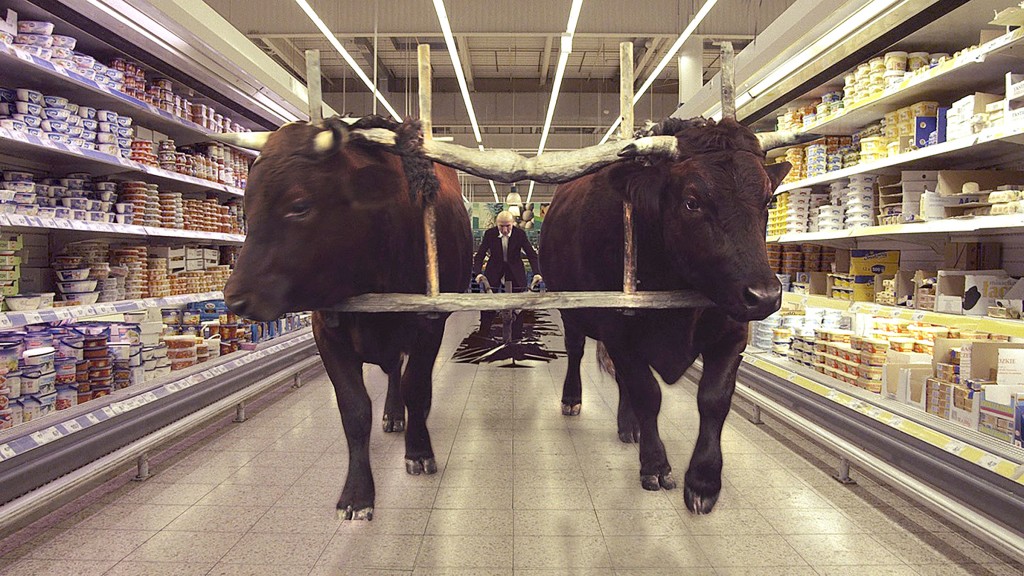Field of Dogs Brings Dante to the Screen
Images courtesy of Gene Siskel Film Center
The 18th Annual European Union Film Festival at the Gene Siskel Center is an excellent opportunity to see films that often have not premiered in the U.S. yet. Field of Dogs (2014) by Lech Majewski, one of the only two Polish films represented, was shown in the festival’s second week. Influenced by memorable events that took place in Poland in 2010 — the crash of the presidential plane in Smolensk, to name just one — Majewski’s film draws its main inspiration from Dante’s Divine Comedy.
Field of Dogs is a part of Majewski’s movie triptych; a cinematographic composition that seeks to create a dialogue with philosophically significant pieces of art. Earlier parts of the triptych, The Garden of Earthly Delights (2004) and The Mill and the Cross (2011), were inspired by, respectively, Bosch’s The Garden of Earthly Delights and Bruegel’s The Procession to Calvary. Painting is also a significant motif in Field of Dogs: The protagonist interacts with the symbolist paintings of Jacek Malczewski and studies Gustave Doré’s illustrations for Dante’s Inferno. Visual arts and Dante’s poetry are seemingly the only things that the protagonist is able to connect to. The Divine Comedy provides him consolation and understanding that he cannot find in human interactions.
Lech Majewski has a personal relationship with painting himself: Before graduating from the National Film School in Lodz, he studied visual arts at the Academy of Fine Arts in Warsaw. He is also famous for having absolute control over his movies: He is a writer, director, cinematographer, editor and composer for all of his projects. The perfectionism of this renaissance man results in a unity of score, cinematography and plot. Majewski’s painting education and admiration for Old Masters’ art is visible in his painterly cinematography. Every scene is carefully planned to be aesthetically appealing. Even if the philosophical and somewhat depressing storyline of Field of Dogs sometimes overwhelms the viewer, the cinematography is a constant visual feast.
The aesthetic pleasure of the movie contrasts with its melancholic plot. The never-named protagonist is a young man whose indifferent facial expression resembles Dante’s serious post-mortem profile. He is a specialist in 19th century poetry, but works as a cashier in a supermarket. We learn that his life has been stagnating since the tragic accident in which he had lost his best friend and his beloved Basia. The mourning protagonist is indifferent to reality, finding solace only in the world of dreams. The only sense of his existence seems to be a desire to sleep. It is suggested that the protagonist’s dreams are unconventional, allowing him to transcend to another realm.
Throughout the movie, the line between dreams and reality becomes blurred. We also learn that the protagonist almost lost sight in the accident. Blindness (in his case, temporary) in literature is often associated with prophetic abilities. That motif originated from the mythological Greek figure of Tiresias, a prophet who was punished by the gods with blindness but comforted with the gift of foreseeing the future. The protagonist in Field of Dogs seems to have a better understanding of the evil in the world thanks to his visionary abilities.
The hero’s personal tragedy intermingles with disasters concerning the whole society. He is often seen watching the news: the flood in Southern Poland, the eruption of the volcano in Iceland, or the death of the Polish President in the plane catastrophe of Smolensk. Within a few months in 2010, so many tragic events had happened in Poland and Europe that some people indeed thought that “the end of the world” was coming.
Majewski creates a disturbing atmosphere in his movie in order to reflect on Dante’s Inferno. In the Divine Comedy the narrator takes a mystical journey through Hell, Purgatory and Paradise. For the protagonist of Field of Dogs, the earthly existence is Hell. The dreams, in which he confronts the ghosts of his criticizing father and ironic best friend, are his purgatory. Finally, they allow him to transcend to a paradise-like state of mind, in which he is united with his beloved.
Despite being written in the 14th century, The Divine Comedy is still relevant to 21st century readers. In Field of Dogs, Dante’s poem is reflected in the life of a contemporary man embedded in a contemporary context of international anxiety.
Field of Dogs is comparable to The Divine Comedy. Majewski argues for the power of art, whether it be literature, painting, or film, to free society from fear and allow humankind to transcend from a hellish market culture to the paradise realm of freedom and beauty.
Weronika Malek
¡
Weronika Malek is a sophomore, focusing on painting and art criticism. “Purgatory” is her favorite canto of Dante’s “Divine Comedy”.
images courtesy of Gene Siskel Film Center
fnewsmagazine.com 23








